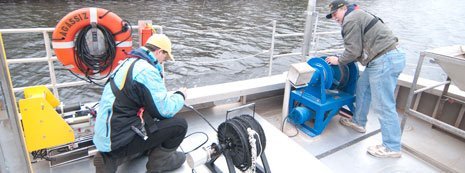Document Type
Article
Publication Date
2-18-2017
Abstract
The lowest matric potential is an important soil property characterizing the strength of retaining water molecules and a key parameter in defining a complete soil water retention curve. However, the exact value of the lowest matric potential is still unclear and cannot be measured due to the limitation of current experimental technology. In this study, a general theoretical framework based on metadynamics was proposed to determine the lowest matric potential in quartz minerals. The matric potential was derived from partial volume free energy and can be further calculated by the difference between the adsorption free energy and self‐hydration free energy. Metadynamics was employed to enhance molecular dynamics for determination of the adsorption free energy. In addition to the water‐mineral interaction, the adsorptive water layer structure was identified as an important mechanism that may lower the free energy of water molecules. The lowest matric potential for quartz mineral was found as low as −2.00 GPa.
Publication Title
Geophysical Research Letters
Recommended Citation
Zhang, C.,
Dong, Y.,
&
Liu, Z.
(2017).
Lowest matric potential in quartz: Metadynamics evidence.
Geophysical Research Letters,
44, 1706-1713.
http://doi.org/10.1002/2016GL071928
Retrieved from: https://digitalcommons.mtu.edu/cee-fp/34
Version
Publisher's PDF


Publisher's Statement
© 2017 American Geophysical Union. Article deposited her in compliance with publisher policies. Publisher's version of record: https://doi.org/10.1002/2016GL071928